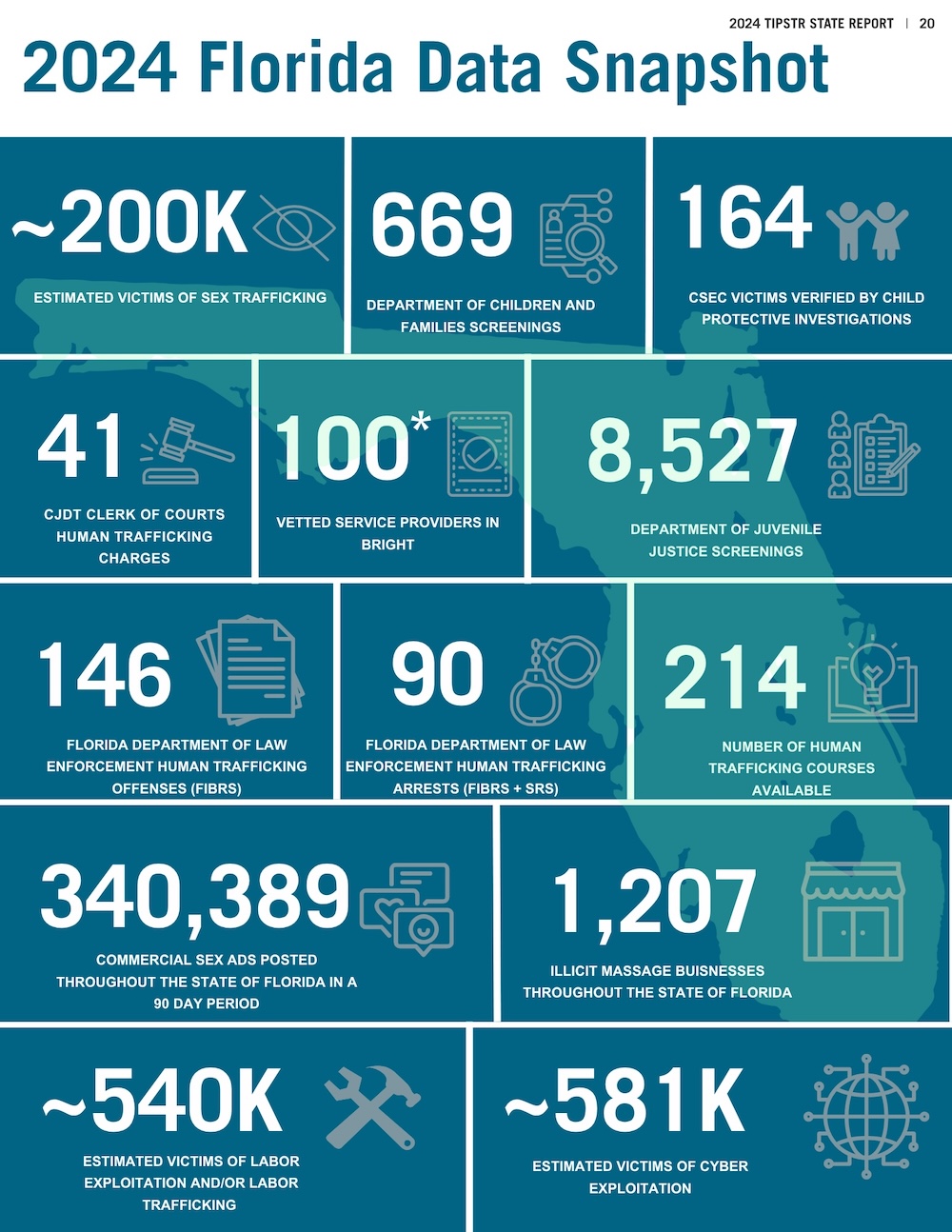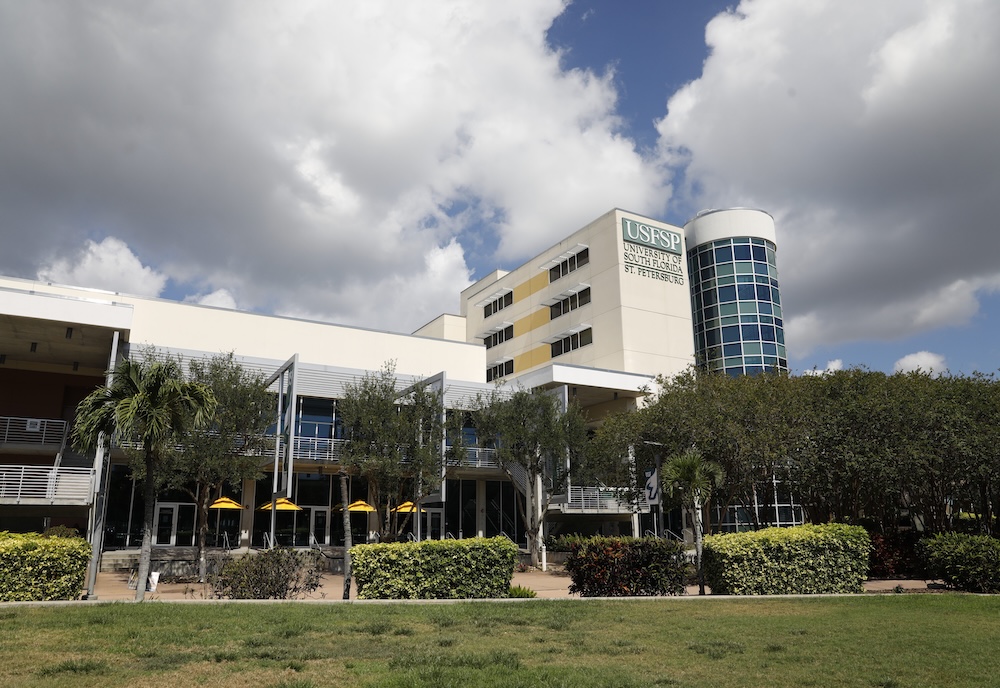By Matthew Cimitile, University Communications and Marketing
A first-of-its-kind report commissioned by the state of Florida shines a light on the high risk and occurrences of human trafficking in the state as well as the growing, coordinated response to combat the crime and aid victims.
“The 2024 State Report on Human Trafficking” estimates that more than 500,000 people were exploited in labor trafficking and 200,000 in sex trafficking within the state in the last year. Minors are estimated to make up half the population being sex trafficked and one-fourth of those involved in labor trafficking.
Though signifying one of the highest rates in the country, the report by the University of South Florida’s Trafficking in Persons (TIP) Risk to Resilience Lab also details how the state is working to disrupt this criminal activity. It highlights the many prevention, protection, prosecution, policy and partnership efforts, including a comprehensive data-driven strategy that led directly to the creation of the report.
“Human trafficking is considered a hidden crime and its victims are often invisible,” said Joan Reid, director of the TIP Lab and a USF St. Petersburg criminology professor. “Given these circumstances, the key objective of this report is to make the hidden and invisible visible to those who have the responsibility to act toward disrupting human trafficking in our communities, counties and state.”
Due to its high population, the number of major cities that host national and international events, prevalence of airports and ports, and major industries such as agriculture, tourism and entertainment, Florida is especially susceptible to human trafficking.

Data snapshot from "The 2024 State Report on Human Trafficking.”
Prevention and criminalization efforts have been growing in recent years. Prosecutions are increasing and there’s greater coordination among state agencies, nonprofit organizations and law enforcement that are enhancing anti-trafficking efforts, according to the report’s authors.
Florida is also at the forefront in human trafficking policy, with penalties that far exceed the national average.
“We believe this annual report will make a substantial impact on anti-trafficking efforts, resulting in many adults and children being spared from the devastating consequences of human trafficking and many survivors receiving safe and effective assistance,” said FL. State Senator Darryl Rouson, the Senate Appropriations sponsor of the TIP Lab.
The report features an analysis of Florida counties with populations of 500,000 or more, focusing on performance and potential challenges responding to human trafficking. Based off available data, researchers rate each of these county’s human trafficking risk, resilience and response on a scale from low to high.
Researchers with the TIP Lab were able to collect and analyze anonymous human trafficking data from 30 state agencies and non-profit organizations to develop a comprehensive view of human trafficking across the state.
"The key objective of this report is to make the hidden and invisible visible to those who have the responsibility to act toward disrupting human trafficking in our communities, counties and state.” - Joan Reid, Director of USF's Trafficking in Persons Risk to Resilience Lab
Data comes from agencies such as the Florida Department of Children and Families, nonprofits including the Crisis Center of Tampa Bay and a survey of 2,500 Floridians designed to further discern the prevalence, geographic distribution and trends related to the crime. It includes numbers of arrests and prosecutions, commercial sex ads, screenings of at-risk youth, services for victims, established community task forces for trafficking and more.
During this process, the TIP Lab worked with several nonprofits in developing technology and data mapping, including using the software Lighthouse developed by Allies Against Slavery.
“We believe in a future where every community has the data it needs to make victims visible and prevent human trafficking,” said John Nehme, president and CEO of Allies Against Slavery. “We are honored to work alongside USF’s TIP Lab and the state of Florida as we aggregate and visualize both statewide and national human trafficking data through our Lighthouse platform. Human trafficking thrives in the shadows, but data brings it into the light.”
The state report was also informed by data collected via the BRIGHT Network. This online platform operated by the TIP Lab helps victims of human trafficking escape their situations by connecting them with organizations and resources in their community. The network allows professionals in anti-trafficking organizations to track, coordinate and provide resources such as health care and safe housing to survivors.
"The TIP Lab has pioneered innovative tools to collect, analyze and share critical data — empowering law enforcement, service providers and policymakers to respond more effectively," said Julie Serovich, dean of USF’s College of Behavioral and Community Sciences. “In just a few short years, researchers with the TIP Lab have made a measurable difference across the state, and I couldn’t be prouder of the impact of this important work."
The TIP Lab became the state repository for anonymous human trafficking data with passage of a state law in 2023. The law mandated the lab collect and analyze all statewide human trafficking data to better understand the magnitude and trends in the criminal activity across the state and over time. The lab also evaluates the effectiveness of state-funded initiatives to combat trafficking.
Based off the collection of statewide data into a database called TIPSTR, USF researchers compile and submit a report each year on the status of human trafficking to the governor, president of the Florida Senate and speaker of the Florida House.
“A report like this had not been done in the past because it seemed impossible to gather all these strands of data located with so many different organizations,” Reid said. “We are extremely grateful for both the state mandate to collect all this data and the funding to make it a reality and support the state’s ongoing response to combat trafficking.”
